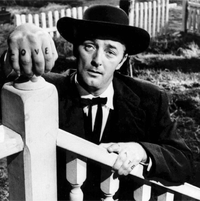Robert Mitchum
Relevance
The cover star of It's Over.
Image was used as part of the 2019 tour backdrops.
Taken from the 1952 film: The Lusty Men.
Image Gallery
Posted by Juan Galeano Toro / Instagram source
Mentioned In
- The Night Of The Hunter
- IT’S STARTING - Release Information (October 12, 2019)
- Turning The Inside Out. - Morrissey Central (July 5, 2021)
Discogs Information
Profile
American actor, born 6 August 1917 in Bridgeport, Connecticut, USA, died 1 July 1997 in Santa Barbara, California, USA. Brother of John Mitchum.
External Links
Wikipedia Information
 |
Robert Charles Durman Mitchum (August 6, 1917 – July 1, 1997) was an American actor. He is known for his antihero roles and film noir appearances. He received nominations for an Academy Award and a BAFTA Award. He received a star on the Hollywood Walk of Fame in 1984 and the Golden Globe Cecil B. DeMille Award in 1992. Mitchum is rated number 23 on the American Film Institute's list of the greatest male stars of classic American cinema. Mitchum rose to prominence with an Academy Award nomination for the Best Supporting Actor for The Story of G.I. Joe (1945). His best-known films include Out of the Past (1947), Angel Face (1953), River of No Return (1954), The Night of the Hunter (1955), Heaven Knows, Mr. Allison (1957), Thunder Road (1958), The Sundowners (1960), Cape Fear (1962), El Dorado (1966), Ryan's Daughter (1970), The Friends of Eddie Coyle (1973), and Farewell, My Lovely (1975). He is also known for his television role as U.S. Navy Captain Victor "Pug" Henry in the epic miniseries The Winds of War (1983) and sequel War and Remembrance (1988). Film critic Roger Ebert called Mitchum his favorite movie star and the soul of film noir: "With his deep, laconic voice and his long face and those famous weary eyes, he was the kind of guy you'd picture in a saloon at closing time, waiting for someone to walk in through the door and break his heart." David Thomson wrote: "Since the war, no American actor has made more first-class films, in so many different moods."



